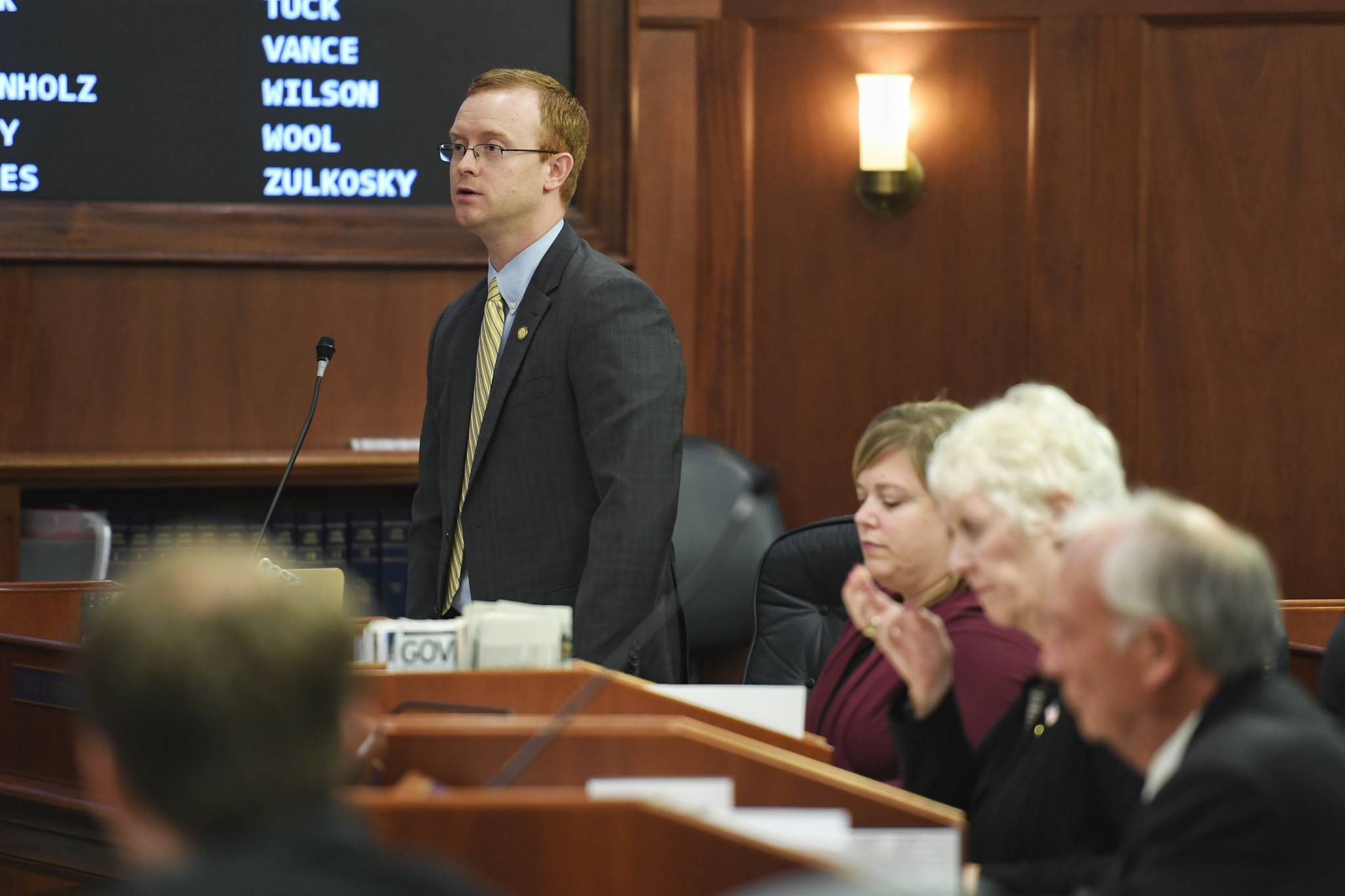In back-to-back floor sessions Monday, both chambers of the Alaska Legislature passed significant legislation on to Gov. Mike Dunleavy.
In the morning, the House first voted to rescind its previous action on Senate Bill 2002 which failed by one vote on July 22. That bill reversed “the sweep” and passed a capital budget. Once rescinded, the House voted 31-to-7 in favor of the bill.
That bill will now go to the governor. Dunleavy can veto certain items from the budget but he cannot veto the reverse sweep, meaning that there are now funds for the Alaska Performance Scholarship and the Power Cost Equalization programs.
Members of the House Republican minority objected to the votes, saying that the Legislature had already voted several times on this same issue. Rep. David Eastman, R-Wasilla, said that he could find no instance in Alaska’s legislative history where the House had voted to rescind after a second consideration. He said the only course forward was an entirely new bill.
Rep. Sarah Vance, R-Homer, voted no on both House votes.
House Speaker Bryce Edgmon, I-Dillingham, replied that the bill had been discussed with the Legislative Legal Division and that there was precedent for the this kind of a vote. Edgmon said that there was nearly a billion dollars at stake that needed to be captured for the good of the state.
Rep. Tammie Wilson, R-North Pole, said that she had spoken with U.S. Sen. Dan Sullivan, R-Alaska, who told her that decisions regarding the federal money didn’t need to be made immeadiately. In response to this, Rep. Gary Knopp, R-Kenai, said that it takes time to implement funding and that delaying any longer would cause further issues for Alaska.
Once the House passed SB 2002, it was the Senate’s turn.
The bill which restored much of the governor’s vetoes, House Bill 2001, passed out of the Senate after that chamber added four amendments to it. Amendments adding money for school debt bond reimbursement, veteran’s services, and rural schools all passed easily, but an amendment allocating a $1,600 Permanent Fund Dividend encountered substantial resistance. Sen. Lora Reinbold, R-Eagle River, said she had voted for SB 2002, “under duress.” It was crucial that the legislature follow the law, she said, and that this bill allowed the government to spend beyond its means, something she could not condone.
During her address to the floor, Senate Majority Leader Lyman Hoffman, D-Bethel, raised points of order four times, asking her to remain on the topic of the current bill.
Sen. David Wilson, R-Wasilla, entered an amendment which would have allocated a full PFD but in two parts. It would have issued first a $1,600 PFD and then a supplemental $1,400 dividend in May. That amendment failed.
Wilson said later, as it became clear that the bill was going to pass allocating only a $1,600 dividend, that he felt the legislature was giving people “false hope.” Without a compromise with the governor, “the conversation isn’t over,” Wilson said. Passing this bill would most likely mean veto by Dunleavy and the legislature finding themselves back in this same position very soon.
Interestingly, Sen. Bill Wielechowski, D-Anchorage, was in agreement with some of his Republican colleagues who said that a $3,000 PFD was the law and should be allocated. Wielechowski said that the state shouldn’t have to choose between a full PFD and state programs, and that other sources of revenue should be explored. He did vote for the bill, saying that not passing this bill would be far too damaging to the state.
In the end, only Reinbold voted against the bill.
Shortly thereafter, the House met again to concur with the Senate’s amendments. After short debate, the House passed the amended bill.
There was more disagreement however, over whether or not the House should adjourn “sine die,” or without a set date to reconvenve. House Minority Leader Lance Pruitt, R-Anchorage, said that all the items on the call of the special session had been completed, and that staying at the capital cost a great deal of tax-payer money.
What work was there left to do, Rep. Gabrielle LeDoux, R-Anchorage, asked rhetorically.
The House voted against adjourning sine die and set Wednesday July 31 as its next meeting date. But in the hallways after the House adjourned many legislators said they were heading home, and that the work was done. It’s not clear how many will be back come Wednesday.
• Contact reporter Peter Segall at 523-2228 or psegall@juneauempire.com.


